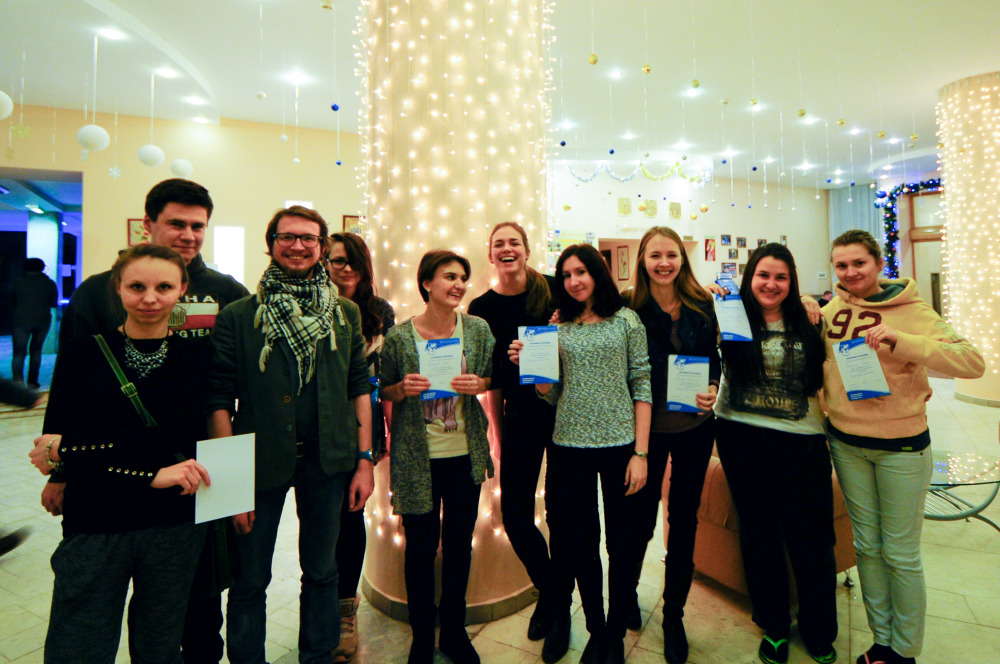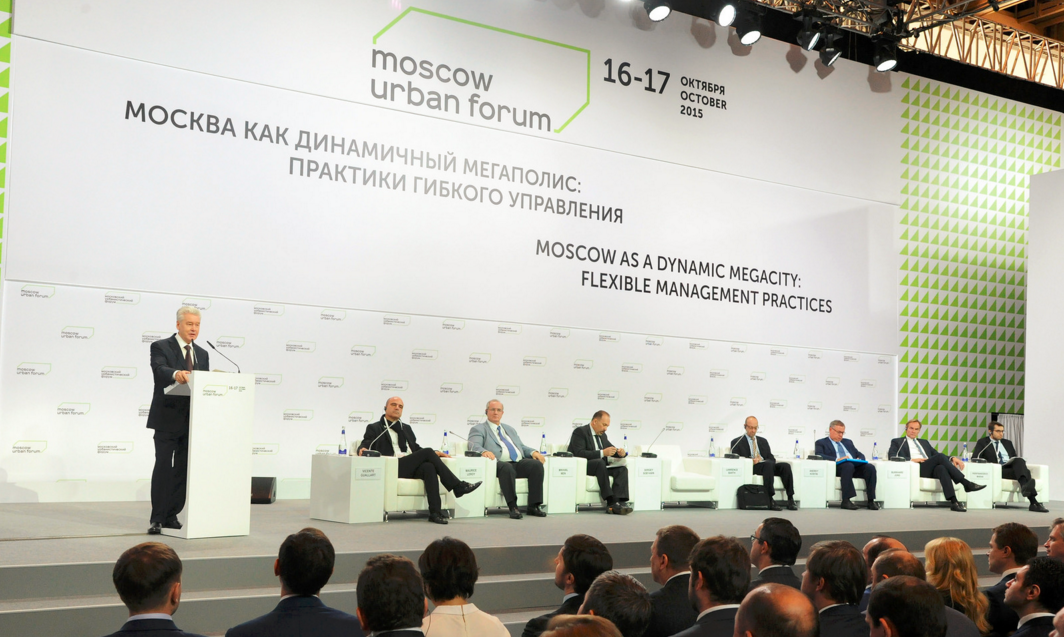Review of 2015 at the HSE Graduate School of Urban Studies and Planning

2015 has been a year of many changes for the School. The appointment of a new Dean at the start of the year kicked off a flood of innovations. Launching exciting projects and participating in national and international events, the school has been building its reputation and increasing visibility both in Russia and as far afield as Iran and Hong Kong. Winter and Summer Schools and the Laboratory of Advocacy Planning bring more ideas and minds to focus on revolutionising the social process of Urban Planning in Russia and around the world.
Alexei Novikov Appointed Dean of the School
The appointment of Alexei Novikov as Dean was one of the most important events of last year. Professor Novikov graduated from the Geography Faculty at Lomonosov, Moscow State University in 1983 and defended his Candidate of Geographical Sciences Degree (D. Sc. equivalent) in 1988. From 2001 - 2012 he was Managing Director of Standard and Poor, Russia and CIS, and from 2012 - 2014, Managing Director of the Thomson Reuters Group in Russia and the CIS. Alexei Novikov has been teaching at the school since 2011 and runs a course on the Cultural Landscape of the City. He is maintaining his predecessor A.A. Vysokovsky’s vision for the school’s development and adding new programmes.
Winter School

The Winter School is a fun educational HSE project which essentially, in a residential week of courses, outlines the issues and knowledge covered in the two-year Master's Programme in Urban Planning. The school attracted students from different cities across Russia, mostly from geography faculties but there were architects and economists among them as well.
Lectures in the Dostoevsky Library
In 2015 the Dostoevsky Library became a venue for regular public lectures and discussions. Besides the conceptual resonance, (Dostoevsky being one of the most urban authors, his understanding of the city cannot fail to be of interest to our school), free entry to the library makes it accessible to all who are interested and at the same time preserves a relatively intimate space, seating 80-90 for a lecture hall. We presented more than 30 lectures/discussions in the library including by Barcelona’s former chief architect Vicente Guallart, president of the Russian Union of Architects Andrei Bokov, Academic Supervisor for the Master’s in Regional and Urban Planning at LSE, Nancy Holman and many others.
Doxiadis week
On May 14th the school marked what would have been the 101st birthday of Greek architect Konstantinos Doxiadis - famous for his project for Pakistan’s new capital, Islamabad. Doxiadis worked in urban planning in many countries in Africa, the Middle East and in Europe.
Urban Studies Students on Winning Team in Architecture Competition
On May 25th the results of the competition to design a concept for the development of the Moscow River Simonovsky Embankment came through. Competitors spent a month studying the territory, its transport access, historical-cultural potential, existing development and functions and visual links. The winners were a mixed team of students from the Graduate School of Urban Studies and Planning, the Moscow Institute of Architecture and RANEPA. (Inter-university) Friendship was victorious and besides, the students’ ideas for the development will be taken into account and could be used in the final project. A jury of eleven experts including Moscow’s chief architect Sergei Kuznetsov evaluated the competition entries.
Adaptive City Summer School
One of the highlights of the year was the June to August summer school - Adaptive City. The school invited leading international researchers in fields variously connected to the concept of a constantly evolving city in the era of megacities and hi-tech to come to Moscow for three summer months to give lectures and join discussions. Seven urbanists including Barcelona architect Vicente Guallart, new media guru Lev Manovich and one of the leading experts on smart cities Anthony Townsend, accepted our invitation. The programme we devised included lectures at the Strelka Institute (as part of our project with the institute), but none of it could have happened without the support of the US embassy in Moscow and in particular the cultural section’s Maria Lvova and the Habidatum company.
Graduate School of Urban Studies and Planning in Iran

Urban School International team: staff and students from the school were invited to participate in the international policy forum on urban growth and conservation in Eurasia in Iran from September 20th to October 3rd. They spent the first ten days on an international student workshop in the ancient city of Hamadan. Students from Iran, China, Russia and Japan discussed the city’s current problems with a team of international tutors and proposed possible ways for it to develop.
The second part of the forum was an international conference in Teheran where they shared experience on historical urban conservation, discussed ways to attract investment to ancient city centres and regulate construction in old districts and much else. The school was represented by Deputy Dean Vitaly Stadnikov, School Expert Marina Sapunov and the students Sofia Pershina and Anastasia Shemetova.
Graduate School of Urban Studies - Programme Director of the Moscow Urban Forum

The school was put in charge of the programme for the 5th annual Moscow Urban Forum at Manege October 16-17. As programme directors we had to choose the main themes, gather the experts and devise the discussions. From this year on the Moscow Urban Forum will split into two parts. While the October forum was focussed on Moscow, the forum planned for July 2016 will combine a global, regional and local agenda.
Laboratory of Advocacy Planning Opening
A new additional structure to the school is the LAP Laboratory the purpose of which is to enable the transformation of urban planning into an adversarial procedure and provide all sides with independent expertise. The idea and inspiration for the laboratory comes from the American urban planner and lawyer Paul Davidoff (1930 - 1984).
Graduate School of Urban Studies in Hong Kong
In December on a business trip organised from the Russian side by the Moscow Department of Foreign Trade and International Communications and the Moscow Centre for International Cooperation, our colleagues Kristina Ishkhanova and Anastasia Dubova visited Hong Kong. They went to a conference on innovation in urban development, and to meetings with representatives of several project developer company directors, shared experience on complex territorial development and went on trips to view project territories.
Anastasia Dubova
Kristina Ishkhanova
Alexei Novikov
Marina Sapunova
Vitaly Stadnikov
See also:
HSE Discusses Urban Development Prospects at the Vysokovsky Forum
The annual Vysokovsky Forum, organised by the Faculty of Urban and Regional Development, was held at HSE University. Officials, business representatives, teachers, and experts gathered to discuss whether development projects should be adapted to residents' needs, whether New Moscow could become a new centre of attraction, and what benefits HSE will gain from launching a new academic department in partnership with A101 Group.
Researchers at HSE University Identify the Most Walkable Areas in Moscow
Experts at HSE University and Lomonosov Moscow State University examined the available data on Moscow's walkability and found the central and south-western parts of the city to be more walkable than others. However, the eastern and south-eastern areas are in need of improvements to make them more pedestrian-friendly. The study has been published in Cities.
HSE University Urban Planners Take Part in Global Mayors’ Forum in Guangzhou, China
A team from HSE University's Faculty of Urban and Regional Development took part in the Global Mayor’s Forum—a global event in urban development. Held in December 2023 in Guangzhou (PRC), the largest congress of urban planners brought together more than 800 guests from 65 cities and 37 countries, as well as nine international organisations.
Card File: Travel Diary
Optimising a city's transportation system requires insights into the dynamics of urban traffic to understand where, how, when, and to what extent people travel within the city. The rationale behind route selection and the choice of transportation mode are also of importance. The primary source of this data is the travel diary, a tool designed to survey people's transport behaviour. Based on a paper by Maria Sergienko, a master's student of the HSE Faculty of Urban and Regional Development, IQ.HSE examines how people's daily travel can be described in detail and why an automated diary cannot yet completely replace its manual counterpart.
‘Seeing Moscow Ranked First among the Cities of BRICS Countries Is Pleasant, but Not Surprising’
An international consortium of research organisations from China, India, and Russia, including HSE University’s Faculty of Urban and Regional Development represented by experts from the Vysokovsky Graduate School of Urban Studies and Planning and the Centre for Social Research and Technological Innovation (CITY), is developing an index of technological and spatial urban development (the Urban & Innovation Environment Index). Recently, a list of the top 10 largest cities of the BRICS countries was published on the project’s website. The Russian capital took the first place in the ranking, followed by Beijing, Shanghai, Sao Paulo, and Guangzhou.
Summer University 2023: ‘A Good Introduction to Urban Studies’
At the start of August, HSE University held the tenth annual Summer University. This year’s programme took the form of a workshop on urban studies. The participants attended four courses from HSE University faculty and invited experts and worked on their own projects to develop a cultural heritage site. Jung Woo Lee, from South Korea, shares his impressions of the Summer University.
‘The Virtual City Is Joining the Real One at the Forefront’
HSE University has launched enrolment in a new online Master’s programme in Digital Urban Analytics. In this interview, the programme’s Academic Supervisor Ekaterina Zarudnaya and its Scientific Supervisor Kirill Puzanov speak about the processes and tasks generated by the online city, the demand for urban analysts, and the specifics of studying in the programme.
A City in Your Mind: HSE Urbanists on Perceptions of Place and Imagined Neighbourhoods
Associate Professor Kirill Puzanov of the HSE Vysokovsky Graduate School of Urbanism and HSE University Professor Oleg Baevskiy have held lectures at the Red Square Book festival. They talked about perceptions of the city, its private and public aspects, chamber and representative spaces, and imaginary (or ‘vernacular’) areas. The open lectures took place as part of the HSE University Open to the City project.
Pivot to the East: A Comprehensive Study of the Cultural and Civilisational Centres of the Non-Western World is the Top Priority
China and the Chinese world, South Asia, Southeast Asia, the Arab countries, Iran, Turkey, Central Asia and Africa are gaining new significance in Russia’s foreign policy. However, we do not know enough about the Eastern countries. It is necessary to change the priorities in education, starting from grammar school. Prospects for the development of domestic Oriental studies in the context of the new stage in the development of the system of international relations were discussed at a round table at HSE University.
‘I Admire HSE Students’ Eagerness to Learn, to Discuss, to Broaden Their Perspectives’
Robert Romanowski was a ‘Digital Professor’ at HSE University in November 2021. In his interview for the HSE News Service, he talked about the specifics of online teaching, his course on Strategic Branding, and the skills that are essential for marketing professionals today.


